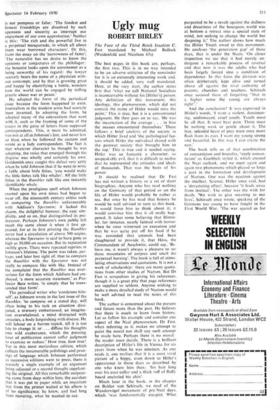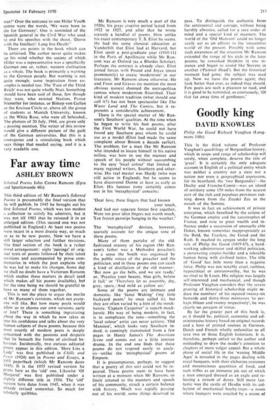Ugly mug
ROBERT BIRLEY
The Face of the Third Reich Joachim C. Fest translated by Michael Bullock (Weidenfeld and Nicolson 65s)
The best pages in this book are, perhaps, the first two. This is in no way intended to be an adverse criticism of the remainder for it is an extremely interesting work and. it should be added, very well translated.
Here, at the very start, the author states first that 'what we call National Socialism is inconceivable Without his [Hitler's] person.
Any definition of this movement, this ideology, this phenomenon, which did not contain the name of Hitler would miss the point.' This is true, but it is a conventional judgment. He then goes on to say, 'He was the incarnation of the average . . . in him the masses encountered themselves.' There follows a brief analysis of the society in which Hitler lived and 'the pathological fac- tors which Hitler the individual shared with the postwar society that brought him to the top.' This is true and it needed saying.
Hitler was so fantastic a character, so unspeakably evil, that it is difficult to realise that he represented the attitudes and ideals of thousands. That was the basis of his power.
• It should be realised that Dr Fest has not written a history or a set of short
biographies. ,Anyone who has read nothing
on the Germany of that period or on the life of Hitler would probably be rather at sea. But once he has read that history he would be well advised to turn to this book. It would force him to think about it; it would convince him that it all really hap- pened. It takes some believing that Himm- ler, for instance, nearly fainted with horror when he once witnessed an execution and that he was quite put off his food if he was reminded that animals had been slaughtered to provide it, that floss, the Commandant of Auschwitz, could say, 'Be- lieve me, it wasn't always a pleasure to see those mountains of corpses and smell the perpetual burning'. The book is full of stimu- lating observations and quotations. It is not a work of scholarship: there are many quota- tions from other studies of Nazism. But Dr Fest is scrupulous in giving his references, though it is a great pity that page references are supplied so seldom. Anyone wishing to make a more detailed study of Nazism would be well advised to read the notes of this book.
The author is concerned about the present and future more than the past. He believes that there is much to learn from history.
Let us follow his example and consider one aspect of the Nazi phenomenon. Dr Fest. when referring to it, makes no attempt to point the moral nor shall any such attempt be made here. Perhaps there is no moral: the reader must decide. There is a brilliant description of Hitler's life in Vienna for six years from when he was nineteen. As one reads it, one realises that it is a most vivid picture of a hippy, even down to Hitler's appearance in those days as described by one who knew him then: 'his hair long over his coat collar and a thick ruff of fluffy beard encircled his chin'.
Much later in the book, in the chapter on Baldur von Schirach, we read of the Wanderviigel movement of pre-Nazi days, which 'was fundamentally escapist. What purported to be a revolt against the dullness and dreariness of the bourgeois world was at bottom a retreat into a special state of mind, not seeking to change the world but despising it.' The author shows how much the Hitler Youth owed to this movement. He analyses 'the generation gap' of those days, that is under the Nazis. 'On closer inspection we see that it had merely un- dergone a remarkable process of reversal and that now it was the adults who had been largely forced into a condition of dependence. In this form the division was often deliberately kept alive and turned above all against the rival authority of parents, churches and teachers. Schirach once accused these of forgetting "that in a higher sense the young are always right".'
And the conclusion? It was expressed in Hitler's words, 'I want a violent, domineer- ing, undismayed, cruel youth. Youth must be all that. It must bear pain. The're must be nothing weak or gentle about it. The free, splendid beast of prey must once more flash from its eyes. I want my young strong and beautiful. In this way I can create the new.'
The book tells us of that combination of romanticism and brutality, 'steely roman- ticism' as Goebbels styled it, which created the Nazi outlook, and we meet again and again two phenomena which played so large a part in the formation and development of Nazism. One was the reaction against the intellect. Science, Hitler once said, had a 'devastating effect', because 'it leads away from instinct'. The other was the wish for death. 'We wish to give meaning to our lives', Schirach once wrote, speaking of the Germans too young to have fought in the First World War. 'The war spared us for war!' Over the entrance to one Hitler Youth centre were the words, 'We were born to die for Germany'. One is reminded of the Spanish general in the Civil War who used . to end his speeches with the shout, 'Down with the Intellect! Long live Death!'
There are points in the- book which can be criticised. The author never quite makes up his mind whether the society of which._ Hitler was a representative was a specifically German one or, rather, western civilisation as a whole. The book is primarily a warning to the German people. But warning is not quite enough; some inspiration from ex- amples is needed too. The 'Face of the Third Reich' was not quite wholly Nazi. Something should have been said of those, few though they were, who resisted Nazism, Pastor Niemoller for instance, or Bishop von Gallen or the Kreisau Circle or, above all, the group of students at Munich University, known as the White Rose, who were all beheaded._ The plotters of 20 July, 1944, are given only a passing mention. The writer of this review would give a different picture of the guilt of the German universities. But this is a courageous and a stimulating book which says things that needed saying, and it is a very readable one.



































 Previous page
Previous page